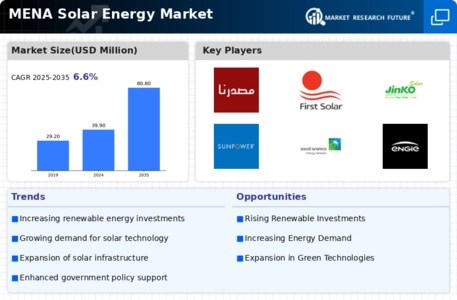Abundant Solar Resources in MEA
The MEA Solar Energy Market benefits from an abundance of solar resources, with many countries in the region receiving high levels of solar irradiance. For example, regions such as the Arabian Peninsula experience over 3,000 hours of sunshine annually, making them ideal for solar energy generation. This natural advantage positions the MEA region as a global leader in solar energy potential. Countries like the United Arab Emirates and Saudi Arabia are capitalizing on this resource by investing in large-scale solar projects, such as the Mohammed bin Rashid Al Maktoum Solar Park, which aims to generate 5,000 MW by 2030. The availability of such vast solar resources not only supports the growth of the MEA Solar Energy Market but also encourages international investments and partnerships.
Government Incentives and Subsidies
The MEA Solar Energy Market is significantly influenced by government incentives and subsidies aimed at promoting renewable energy adoption. Many governments in the region have implemented favorable policies to encourage solar energy investments. For instance, the Saudi Vision 2030 initiative aims to diversify the economy and reduce dependence on oil, with a target of generating 58.7 GW of renewable energy, primarily from solar sources. Similarly, the Egyptian government has introduced feed-in tariffs to attract private investments in solar projects. These incentives not only lower the financial barriers for investors but also stimulate the growth of the solar energy sector. As a result, the MEA Solar Energy Market is likely to witness accelerated growth, driven by supportive regulatory frameworks and financial mechanisms.
Growing Energy Demand in MEA Region
The MEA Solar Energy Market is experiencing a surge in energy demand, driven by rapid urbanization and population growth. As countries in the Middle East and Africa continue to develop, the need for reliable and sustainable energy sources becomes increasingly critical. For instance, the International Energy Agency projects that electricity demand in the MEA region could rise by over 60 percent by 2040. This growing demand presents a substantial opportunity for solar energy solutions, as they offer a clean and renewable alternative to traditional fossil fuels. Governments are recognizing this potential, leading to increased investments in solar infrastructure. Consequently, the MEA Solar Energy Market is likely to expand significantly, as stakeholders seek to meet the rising energy needs while addressing environmental concerns.
Technological Innovations in Solar Energy
The MEA Solar Energy Market is poised for growth due to ongoing technological innovations in solar energy solutions. Advancements in photovoltaic technology, energy storage systems, and smart grid integration are enhancing the efficiency and reliability of solar energy systems. For example, the introduction of bifacial solar panels, which capture sunlight on both sides, has the potential to increase energy output significantly. Additionally, energy storage technologies, such as lithium-ion batteries, are becoming more affordable and efficient, enabling better management of solar energy supply and demand. These innovations not only improve the performance of solar installations but also make solar energy more competitive with traditional energy sources. Consequently, the MEA Solar Energy Market is likely to benefit from these technological advancements, attracting more investments and facilitating wider adoption of solar solutions.
Regional Climate Initiatives and Sustainability Goals
The MEA Solar Energy Market is increasingly shaped by regional climate initiatives and sustainability goals. Many countries in the MEA region are committing to reducing greenhouse gas emissions and transitioning to cleaner energy sources. For instance, the United Arab Emirates has set a target to generate 50 percent of its energy from clean sources by 2050. Such commitments are driving investments in solar energy projects, as they align with global sustainability trends. Furthermore, international agreements, such as the Paris Agreement, encourage MEA countries to adopt renewable energy solutions to meet their climate targets. This growing emphasis on sustainability not only enhances the credibility of the MEA Solar Energy Market but also attracts foreign investments and partnerships, fostering a more robust solar energy ecosystem.

















